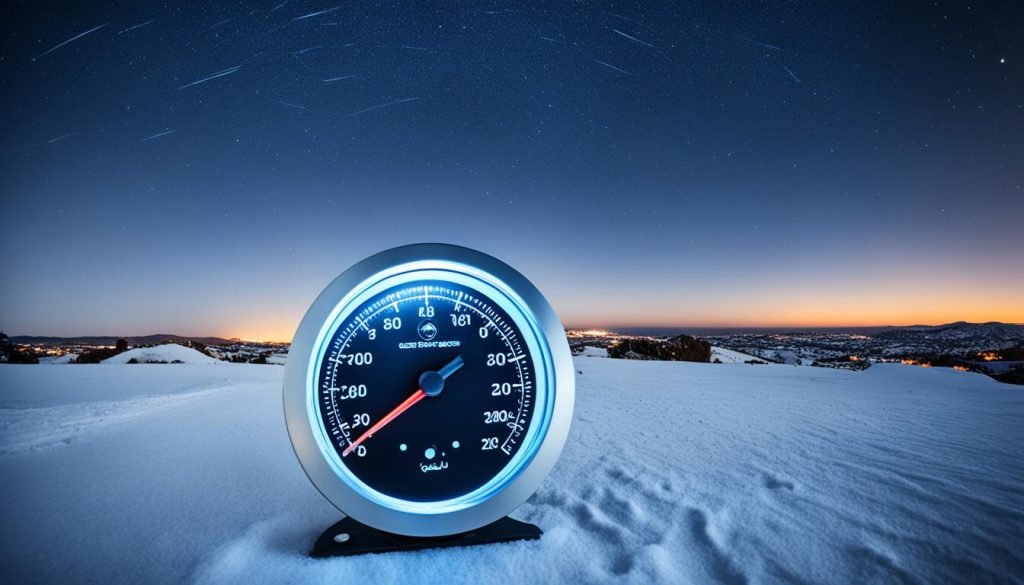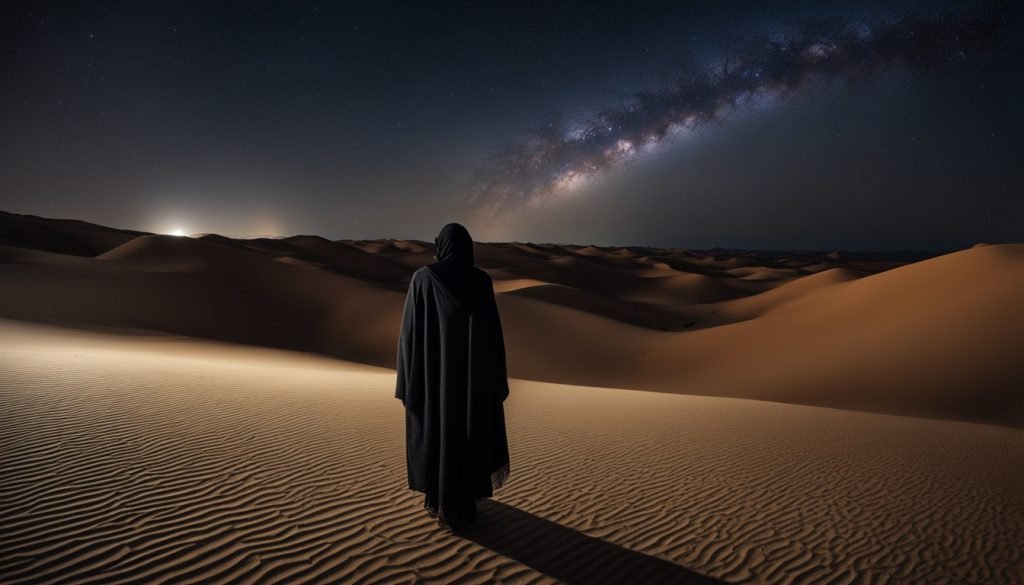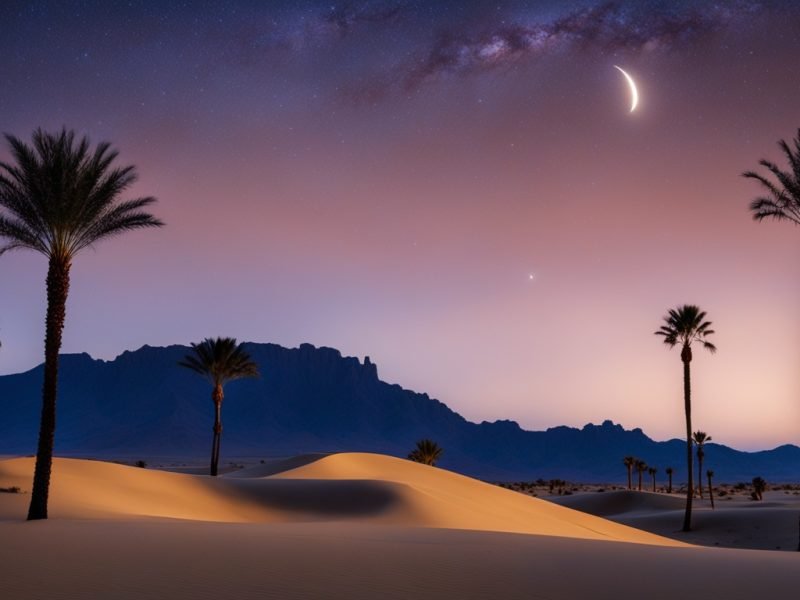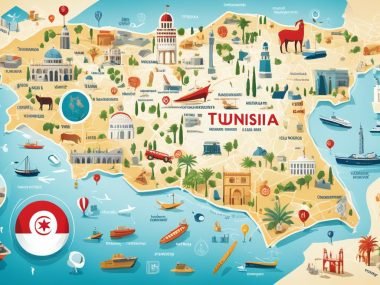In Tunisia, night weather varies widely across different regions. The northern coast, by the Mediterranean, enjoys mild nights. Winter nights see temperatures around 16/18 °C, summers can be as warm as 32/33 °C. But head inland, to desert areas, and the temperatures drop significantly after hot days.
Rainfall in Tunisia follows the Mediterranean’s pattern, increasing in late autumn and winter, especially by the coast. Places like Tunis get about 485 millimetres of rain yearly. While summers are dry, the Sirocco winds can heat things up unexpectedly. They sometimes bring sandstorms too.
The sea near the northern coast gets too cold for swimming from December to May. But from June to mid-October, the water becomes inviting, especially on the east coast where it stays warm into October.
Key Takeaways
- Tunisia’s night temperature is influenced by both Mediterranean and desert climates.
- In coastal regions, night temperatures are relatively mild, averaging 16/18 °C in winter and 32/33 °C in summer.
- Inland areas, especially desert regions, experience significant temperature fluctuations, with cooler nights.
- Rainfall in coastal Tunisia follows a Mediterranean pattern, peaking in late autumn and winter.
- Sirocco winds can elevate temperatures and occasionally cause sandstorms.
Overview of Tunisia’s Night-time Climate
Planning a visit to Tunisia requires knowing about its night-time climate. This North African country has weather that changes a lot after dark, thanks to its position. It has Mediterranean and desert influences.
The Influence of Coastal and Desert Climates
In Northern Tunisia, by the Mediterranean, it’s milder in winter with some rain. Places like Bizerte get about 650 mm of rain a year. This makes it wetter than other parts of Tunisia. The east coast, where you find Sousse and Sfax, has similar temperatures but less rain in winter.
As you move south towards the Gulf of Gabès and beyond, it gets drier. This is because the weather fronts from the Atlantic have less influence there.
In contrast, inland areas see a big drop in temperature at night. Especially in winter, desert areas can get really cold, even below freezing. Knowing this helps tourists pack right for both coastal areas and inland adventures.
Getting to know the night-time weather in Tunisia helps travellers plan better. They can enjoy their stay without surprises. Tunisia’s varied night-time weather is fascinating. It shows how diverse the country’s landscape is.
Typical Night-time Temperatures in Tunis
In Tunis, the capital on Tunisia’s north coast, night-time temperatures change throughout the year. This knowledge is key to enjoying the city’s lively evenings, despite the chill.
Winter Night-time Temperatures
January is the coldest month, with average temperatures around 12.3 °C. But, the Tunis night time temperature might drop to 2.5 °C. Such cold nights are common, showing Tunis’s evening chill.

Summer Night-time Temperatures
During July and August, the average temperature is 28 °C. Daytime can reach above 40 °C, mainly because of desert winds. Yet, the Tunis night time temperature falls from these highs but stays warm. This makes evenings in Tunis pleasant, despite the day’s heat.
How Cold Is Tunisia At Night in Inland Areas?
Inland Tunisia, especially near Tozeur in the desert, has a very different climate from the coast. During summer, it gets very hot, with temperatures reaching between 38 °C and 40 °C. But night-time in Tunisia’s inland regions changes a lot.
In winter, the temperature at night can drop nearly to freezing. This happens because deserts let go of heat quickly once the sun goes down. Still, even with cold nights, sunny days are common, making for a mix of cool nights and warm days.
Summer nights in Tunisia stay quite warm. This warmth at night is typical of deserts since sand holds onto the day’s heat, keeping nights warmer.
- Day Temperatures in Summer: 38 °C to 40 °C
- Night Temperatures in Winter: Near freezing
- Night Temperatures in Summer: Warm due to heat retention
Temperature Drops in Tunisia After Sunset
In Tunisia, the temperature falls sharply after the sun goes down. This drop is more pronounced in the desert. The change is due to various weather factors that make nights much cooler.
Mechanisms Behind Rapid Cooling
Deserts in Tunisia have clear skies that don’t keep the warmth in at night. So, the heat from the day vanishes quickly into the air after sunset. This causes a steep drop in the Tunisia night temperature.
Also, the air in these places doesn’t hold much moisture. This low humidity aids the quick loss of heat. It’s why temperatures fall so drastically at night.
Not just deserts, but coastal regions in Tunisia also cool down at night. However, this cooling is less intense by the sea. Coastal areas experience milder temperature changes.
Knowing how temperature in Tunisia after sunset changes is key. It helps both visitors and locals plan their evenings and stay comfortable at night.
Tunisia Night-time Weather by Season
It’s vital to know Tunisia’s night-time weather before you visit. The country has a variety of weather conditions throughout the year. So, you need to prepare properly for each season.
Spring and Autumn Conditions
In spring and autumn, the night-time weather in Tunisia is mild and nice. These seasons are perfect for visiting places like Tunis. The weather is just right for night walks and being outdoors.
Visitors will find the evenings pleasant with the right clothes. Tunisia’s charm shines under the moonlit sky during these seasons.
Winter Conditions
Winter days in Tunisia are mild and sunny. But, the nights get much colder, which means wearing warm clothes is a must. The temperature drops quickly once the sun sets.
This quick change is typical of Tunisia’s winter. So, the Tunisia nighttime weather forecast suggests wearing layers. This helps stay warm during the cold evenings.
Preparing for Tunisia’s Night-time Weather
When getting ready for Tunisia’s night-time weather, it’s key to remember the big changes in temperature, especially during winter. The Tunisia evening coldness might surprise you, especially near the coast. Here, an mix of light and warm clothes is wise. Make sure to pack sweaters, jackets, and maybe a raincoat or umbrella for winter rain.

Inland and desert areas in Tunisia are a bit different. Here, days can be very hot, but nights get pretty cold. So, it’s smart to have light clothes for day and warm clothes for night. Also, don’t forget a scarf and sunglasses to keep sand and dust away.
| Region | Daytime Clothing | Night-time Clothing | Additional Items |
|---|---|---|---|
| Coastal Areas | Light Clothing | Warm Sweaters, Jackets | Raincoat or Umbrella |
| Inland Areas | Light Clothing | Warm Layers, Jackets | Scarf, Sunglasses |
To really enjoy your travels in Tunisia, understanding the night-time weather is important. No matter if you’re in the milder coastal areas or the harsher inland, being well-prepared clothes-wise is key. This ensures you’re comfortable at all times.
Conclusion
Knowing how cold it gets in Tunisia at night is key for visitors. The temperatures change a lot, especially between the coast and the desert. Near the sea, it’s milder at night due to the sea’s calming effect.
However, the desert areas inland get much colder after the sun goes down. Sometimes, they can even be near freezing in winter.
To stay comfortable, be ready for these big changes. Wear light clothes during the day by the sea. But have warmer clothes for cold nights.
When going inland, especially in winter, take both light and warm clothes. Don’t forget a good jacket and maybe a scarf or hat. Being prepared lets you enjoy all the different climates Tunisia has.
Understanding the night temperatures is important to enjoy Tunisia’s beautiful places. Whether you’re by the sea or in the desert, being prepared makes your visit comfortable and memorable. If you’re ready for the cold nights, you’ll have a great adventure in Tunisia.







